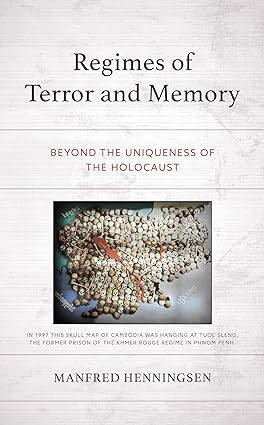Terror and Memory

Manfred Henningsen was born in 1938 in Flensburg, Germany, and he grew up in post-war Germany. He studied in West Berlin, before the Wall was built, and spent his graduate life and work at the University of Munich from 1958 to 1969, where in 1967 he received his PhD in political science under Eric Voegelin. In 1970, he accepted an offer from the Department of Political Science at the University of Hawaii at Manoa; he taught here until he retired in 2020.
This biography is critical to understand Regimes of Terror and Memory because, as Henningsen states in the Introduction, “This is and is not another book about the Holocaust but also my attempt as a German to make sense of the experience that were shaped by that event.” Henningsen’s first remembrance of the Holocaust was his high school visit to Dachau and watching the French documentary film— Night and Fog— about the Nazi concentration camps. But it was Eric Voegelin’s criticisms of German society (later published in Hitler and the Germans) that failed to resist the rise of Nazism— this had a tremendous impact on Henningsen because it brought a taboo subject to be discussed in public. Likewise, Hannah Arendt’s Eichmann in Jerusalem added to the public debate in Germany about the German culpability and responsibility of the Holocaust.
When Henningsen moved to the United States permanently in 1969, he observed the poor treatment of African Americans, which became even more vivid when he married his wife, an African American. These encounters led Henningsen to research slavery and racial discrimination in America, leading him to explore the broader questions of how the state employed terror against its citizens in Nazi Germany, segregated America, Khmer Rouge Cambodia, or Suharto Indonesia. For Henningsen, the “diversity of mass killing regimes” shared a common rejection of spirituality in their ideologies. It was only after the mass slaughter that these societies would either remember or forget their past atrocities.
For Henningsen, Germany is a model case for remembering and reconciling itself to its past crimes. Although it was the Eichmann trial that brought recognition to the crimes that Germany society had committed, it was the acts of everyday life that led German society to reconcile itself with its past. Artists and educators that portrayed Germany’s collective descent into evil during the Nazi regime made everyone in German society feel responsible, and thus reconciled, to what had transpired. By contrast, the United States, according to Henningsen, has failed to acknowledge the evils of slavery and segregation. This amnesia, or “politics of forgetting,” prevents any reconciliation in the United States, because it first has yet to recognize the evils it had committed.
Henningsen pointedly reminds us that even societies become reconciled to their past crimes, such a movement is neither linear nor straight-forward—and sometimes is never achieved. He describes such controversies of the German concentration camp, Buchenwald, or the Japanese Yaskuni Shrine, to show how the politics of remembering and forgetting are never fully resolved.
But perhaps the most controversial claim Henningsen makes is that the uniqueness thesis of the Holocaust must be abandoned:
Visits to Auschwitz-Birkenau and Phnom Penh’s Tuol Sleng prison in 1997 finally made me recognize the problematic claim of the uniqueness thesis of the Holocaust. Walking through Auschwitz-Birkenau in September 1997 and through the halls of the Cambodian prison in December of the same year, and then visiting one of the killing fields outside of Phnom Penh, made it clear to me how fallacious it was to essentialize the Jewish Holocaust as the unique manifestation of evil in human history. Accepting the uniqueness argument makes it impossible to look at other regimes of terror as comparable scenarios of human destruction.
To support his position, Henningsen points out that contemporary philosophers who have written about evil reject the Holocaust uniqueness claim, and they refuse to engage in questions of theodicy. But perhaps the more interesting question, which is not explored in the book, is whether an examination of the question of theodicy would make the uniqueness claim valid.
Regimes of Terror and Memory is a fascinating book about the genocides that have haunted the graveyard of the twentieth-century. Weaving his autobiography with global events, Henningsen paints a fascinating picture of regimes that confront—or do not confront—their past atrocities. From Mao’s China to Hitler’s Germany, from Suharto’s Indonesia to Imperial Japan, from antebellum America to Stalin’s Russia, Regimes of Terror and Memory illuminates the heart of darkness in each place and how they are each equally evil.




